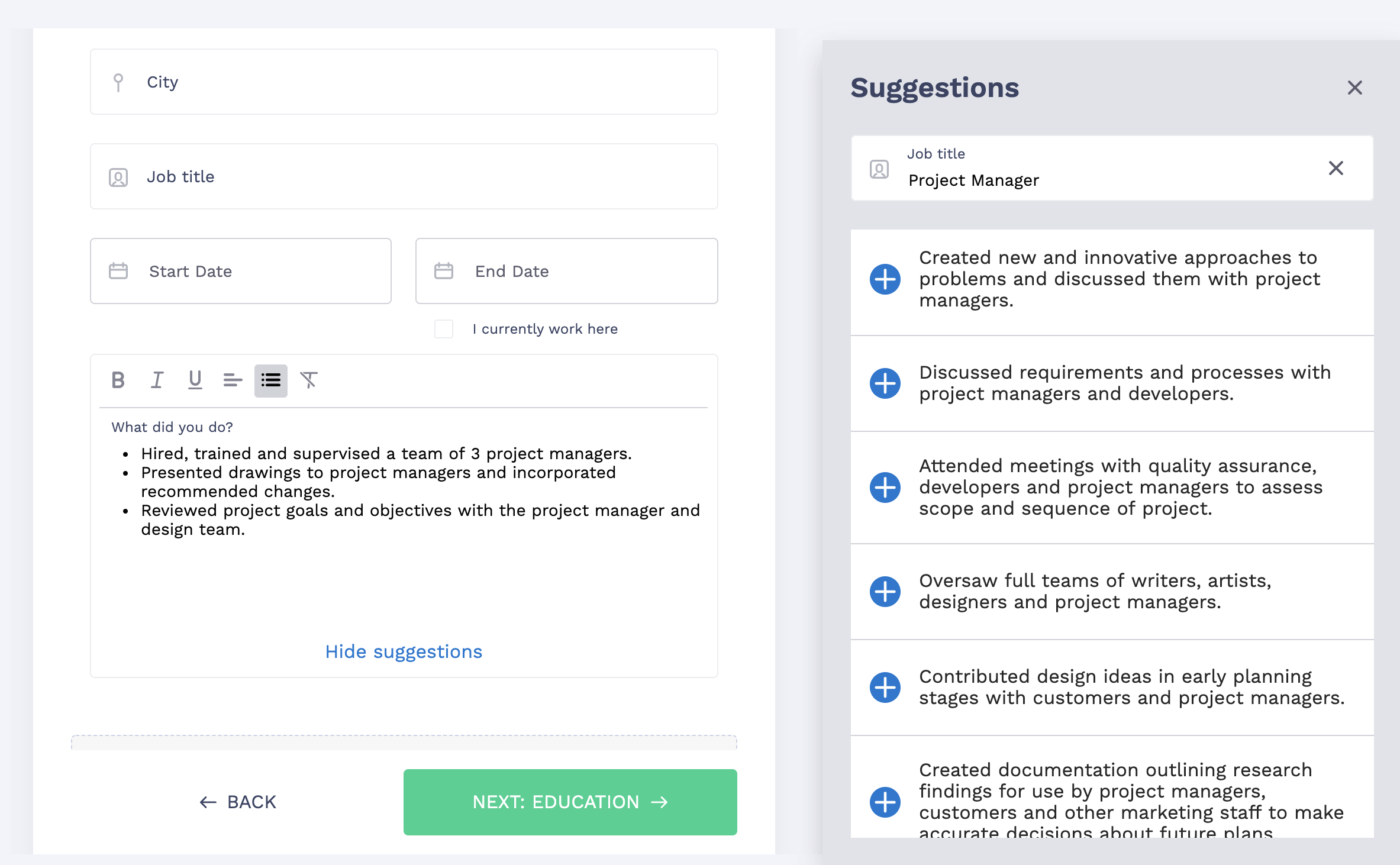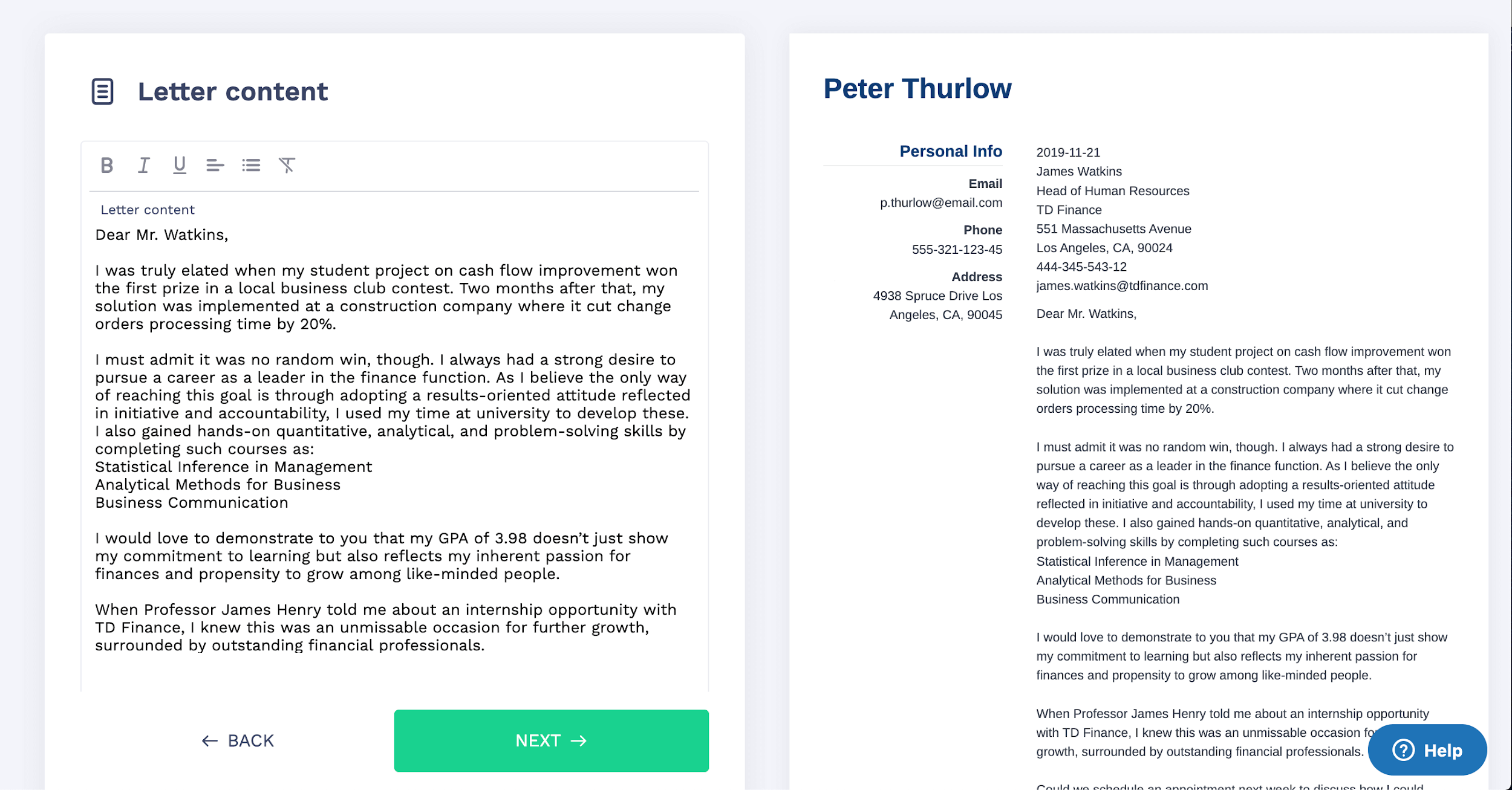
Make your grand entrance with an impeccable acting resume that shows you’re the right person for that professional role. Ready to start a new episode? Follow our guidelines.
Career Expert
You're a master thespian. You like to stand in the spotlight. The stage and the silver screen are almost yours. Almost, because. You need to show the world what you’re capable of.
So before you walk the red carpet, you need to make a smaller step first: get that dream role. And for that, you need an irresistible acting resume.
In this article, you’ll find:
Save hours of work and get a job-winning resume like this. Try our resume builder with 20+ resume templates and create your resume now.

What users say about ResumeLab:
I had an interview yesterday and the first thing they said on the phone was: “Wow! I love your resume.”
Patrick
I love the variety of templates. Good job guys, keep up the good work!
Dylan
My previous resume was really weak and I used to spend hours adjusting it in Word. Now, I can introduce any changes within minutes. Absolutely wonderful!
George
Not sure you actually want to write an actor resume? See our other guides:
Andrew M. Dilbeck
SAG-AFTRA
Anastasia C. Smith
Summary
Hard-working actor with 5+ years of experience in productions like PLUSHIE PARADISE and THE SAD BANANA SHOW. Extensive theater experience in productions like BIG BOX OF BONES and special skills in dance, singing, and martial arts. INRE award winner (Best Actor (Musical) Small Stage).
Personal stats
Acting Credits
Television
THE SAD BANANA SHOW - LeadFruity Productions Ltd.
LADY HAMLET OF ELM STREET - SupportingHorrific Studios Ltd.
Theater
PLUSHIE PARADISE - Huggy Wuggy Games on Stage Festival (Dir. Johannes Schnee)
BIG BOX OF BONES - Captain Greenbeard The Bottle of Rum Company (Dir. Jack Pigeon)
THE KRAMPUS SHOW - Krampus Christmas Stage Festival (Dir. Peter Black)
Education
Bachelor of Arts in Theater
Missouri State University, Springfield, MO
September 2014–July 2018
Training
Skills
Awards
The job of an typically involves performing in theatrical productions, film, television, and other forms of media. They are tasked with studying scripts, rehersing and later on performing, bringing to life characters, themes, and stories for an audience.
Let's start with the basics.
An actor resume is a brief, easy-to-scan document that shows casting directors your experience, special skills, and contact information.
Acting resumes have a specific layout that's different from typical resumes written for other jobs. So if you're using a resume builder, make sure you stick with one of the best resume builders on the market—the substandard ones won't let you customize your resume layout, and you might end up with something completely unsuitable for an actor.
But no matter if you're creating your resume for acting using a resume builder or a word processor like Word or Google Docs, make sure you follow these best practices:
No matter if you have tons of experience or not, the same guidelines apply if you want to have the best acting resume. This is what casting directors want to see and are used to seeing:
These are the golden rules of an acting resume template. Follow it and incrase your chances of landing the role you always wanted. Now, let's go into details of your acting resume.
If you’ve ever written a resume for a non-acting job, you’ve probably heard that photos on resumes are not a good idea. And it’s true for most jobs out there.
However, acting is different. For an acting resume, you do need a headshot because directors do need to know what you look like and what characters you can play. But before you grab a random resume template with a headshot in the corner of the page.
Remember that your headshot should be BIG. Like 8x10 inches big. Yes, that’s an entire page! And, unlike those resume templates with little photos in the corner, your headshot goes at the back of your acting resume.
The best option is to staple the headshot to your resume back-to-back. Make sure you staple it in all four corners so that the headshot doesn’t accidentally get separated.
However, you may also print your headshot on the back of your acting resume if you wish. There’s a catch, though: some casting directors prefer to separate resumes and headshots for filing purposes. Also, updating your resume becomes quite pricey because you’ll have to print your headshots once again.
Now that we've dealt with the back of your resume for acting, it's time to write the front page!
The resume header is the place where you put your contact info: your full name, email address, phone number, and any relevant online presence. It's also a good idea to put your agent's contact info there.
Now, what are "relevant online presences"? Those could be your website, your YouTube channel, or your Insta profile—as long as the content you post there is relevant to your acting career. Avoid linking to private profiles!
Expert Hint: Always double-check your resume header for typos. Your email address or phone number spelled wrong means you can't even be contacted!
After you've crafted your resume header, we suggest you skip the paragraph that typically goes right after it—the resume profile—and move straight to your acting credits. Don't worry, we'll get to the resume profile later on.
So, how do you list your roles on the actor resume? Acting resumes aren’t written like typical resumes for the job market. Instead, you should create subheadings like these:
If you have lots of credits to list, feel free to make more specific sections. For example, you could divide the Theater section into Broadway, National Tours, and Regional Theater. Within each section, make three columns:
And list them in reverse chronological order. Here’s what your credits could look like:
Television
THE SAD BANANA SHOW - LeadFruity Productions Ltd.
LADY HAMLET OF ELM STREET - SupportingHorrific Studios Ltd.
Theater
PLUSHIE PARADISE - Huggy WuggyGames on Stage Festival (Dir. Johannes Schnee)
BIG BOX OF BONES - Captain GreenbeardThe Bottle of Rum Company (Dir. Jack Pigeon)
THE KRAMPUS SHOW - KrampusChristmas Stage Festival (Dir. Peter Black)
That’s all the info you need to include about your roles! Don’t do something like this:
If you write your resume for acting this way, you’ll simply come off as unprofessional. And that’s the last thing you want.
Do you need a fancy degree to be a great actor? Not necessarily.
However, the education section of your resume is still valuable—use it to list your acting school achievements. Like in this acting resume example:
Bachelor of Arts in Theater
Missouri State University, Springfield, MO
September 2014–July 2018
Omit the bullet points and keep your education section as short as possible if you’re a seasoned actor with some impressive credits to show.
But if you’re just starting out, listing some carefully picked achievements can prove that you “had it” even back in school. These could be specific theater shows you participated in, acting awards and commendation you received, or relevant extracurricular lessons you attended, such as ballet.
Got any masterclasses and extra courses to list? Make a separate section for those—we’ll show you exactly how to do it later on.
The ResumeLab builder is more than looks. Get specific content to boost your chances of getting the job. Add job descriptions, bullet points, and skills. Easy. Improve your resume in our resume builder now.

Nail it all with a splash of color, choose a clean font, and highlight your skills in just a few clicks. You're the perfect candidate, and we'll prove it. Use our resume builder now.
Acting is a skill set in itself. But to land a specific role (or type of role), you need to demonstrate some very specific skills. These special skills for acting resume may vary from role to role, but some are more universal than others.
Keep in mind that honesty is your best weapon here. The last thing you want is to be asked to prove your martial arts skills when you never took any classes. So don’t blindly plagiarize skill lists from the internet. However, you can absolutely use them as reference when making your own resume for acting.
Accents are generally very tricky, so don’t list them as a special skill for your acting resume unless you had proper training. Also keep close attention to the role requirements. Sometimes you might find they are looking for someone with a niche skill to fill the role. So be adaptable like the Marvel Symbiotes.
Expert Hint: Depending on the roles you want, you can also list some quite unusual skills. For example, if your dream is to star in a Bosch commercial, by all means, put woodworking on your skills list (provided you can actually do it).
You've put quite a bit of information on your resume. But what about your awards? And what about those acting masterclasses you took? And that extremely fascinating hobby of yours? Can you put them on your resume for acting?
Yes, that's where the extra sections come in.
Hobbies are a really good way for you to show a connection between you and the role you’re auditioning for, even before the audition itself happens. If you’re applying for a role as a commando in an action movie and you do bodybuilding as a hobby, that’s going to be a great boost to your chances.
As for awards, they can serve a more generalized purpose as long as you keep them relevant. Maybe you’ve won a local award for the main role in a short film? Or you already went a step further and received something like an Obie or Lucille Lortel? Be proud of it and show them on your acting resume.
But, even if you’re very proud of them, don’t go too far back in time when looking for your acting awards. Something you received back in high school doesn’t carry much weight, and it may even hamper your attempt at getting the role.
If you don't have anything to mention, just skip the hobbies section altogether. It’s optional after all. So show only your best, that will surely aid your acting resume.
This resume section doesn’t appear in most people’s resumes. That’s because it’s pretty much forbidden to include such personal information. And not just because it’s irrelevant. It could give ground to potential discrimination.
However, when a casting director is putting together an ensemble, they want to know more. How tall each actor is, or how much do they weigh. And even though your resume comes with a headshot, the eye color might not be 100% accurate.
So make sure you include your physical details (height, weight, hair and eye color) on your resume.
In general, you shouldn’t write your age on your resume unless you’re under 18 (for legal reasons, casting directors need to know if you are underage or not).
Have you ever walked out of a movie theater 15 minutes after the movie began just because the opening scenes were too bland to spark any interest? Now imagine you’re a casting director who opens an actor’s resume and sees it start with:
Actor seeking a breakthrough role. I played the Christmas Tree in a high school play, and I was also an extra in Evie Leech The Pink-Haired Vampire (a film made by my best friend and never released).
Would you be bothered to continue reading? Probably not.
The first lines of your resume matter as much as the opening scene of a play. So make sure yours makes a lasting impression.
The short, catchy paragraph that comes after your resume header is called a resume profile. Depending on your experience level, your resume profile can be either a resume summary or a resume objective.
A resume summary is, well, a brief summary of your key professional achievements, skills, and awards (if any). If you’ve got a few years of experience under your belt, go for a resume summary.
If you don’t have many epic achievements yet, opt for a resume objective instead. A resume objective highlights how your background and skills will bring value to the production.
Hard-working actor with 5+ years of experience in productions like PLUSHIE PARADISE and THE SAD BANANA SHOW. Extensive theatre experience in productions like BIG BOX OF BONES and special dance, singing, and martial arts skills. INRE award winner (Best Actor (Musical) Small Stage).
This resume summary is like a great teaser trailer that condenses all the highlights into a short, breathtaking sequence.
What about this one: Experienced actor looking for work. I’ve played in 5 TV shows and by the way I can speak French.
Let’s be honest: this one deserves a bag of rotten tomatoes. It’s so unspecific and incoherent that casting directors won’t even bother to read the rest of the resume.
Passionate actor with BFA in Cinema and Television Arts from Columbia College and professional experience in stage and screen acting. Backed by a reputation for dedication to the craft and a network of theater and television contacts.
This actor’s experience probably comes from their studies and masterclasses rather than “regular” acting gigs. So their resume objective focuses on other things, such as their excellent education and reputation.
Looking for my first big role. I played in a couple of films while in college, so I know what a camera looks like. Maybe they know what a camera looks like, but that’s not enough to land a role.
Expert Hint: It’s easier to write your resume summary or resume objective after you’ve written the rest of your resume. That’s why we recommend you write it last.
Wait, you’re not done yet. Submitting a resume for acting isn’t enough. You also need to introduce yourself in a cover letter.
Don’t worry, though—we’ve got you covered. Just check out our guide to writing an acting cover letter and follow the steps outlined there.
Here’s a short preview of the writing process:
Acting cover letters are shorter and less formal than the cover letters typically written for corporate jobs. With our dedicated guide, writing your actor cover letter won’t take long.
Double your impact with a matching resume and cover letter combo. Use our cover letter generator and make your application documents pop out.

Want to try a different look? There's 21 more. A single click will give your document a total makeover. Pick a cover letter template here.
For an actor resume that gets auditions:
Got questions on how to write a great resume for acting jobs? Not sure how to show acting on a resume? Need to learn more about writing resumes? Leave a comment. We’ll be happy to reply!
At ResumeLab, quality is at the crux of our values, supporting our commitment to delivering top-notch career resources. The editorial team of career experts carefully reviews every article in accordance with editorial guidelines, ensuring the high quality and reliability of our content. We actively conduct original research, shedding light on the job market's intricacies and earning recognition from numerous influential news outlets. Our dedication to delivering expert career advice attracts millions of readers to our blog each year.
Written by Olga BerOlga is a career expert with a background in teaching. At ResumeLab, she writes actionable guides to help job-seekers highlight their unique strengths and unlock their career potential.







![]()











How do you write a resume? With so many conflicting opinions out there, we’ve set out to find the ultimate answer to this question.
Michael Tomaszewski, CPRW
Certified Professional Resume Writer, Career Expert

A carefully crafted reference page can give you a competitive edge over other job candidates. But do you know how to list references on a resume? You’re about to find out.

You can stop searching—this is the ultimate collection of best resume tips that can help you succeed in 2024. These resume writing tips will help to impress hiring managers.
Roma Konczak, CPRW
Certified Professional Resume Writer, Career Expert
* The names and logos of the companies referred to above are all trademarks of their respective holders. Unless specifically stated otherwise, such references are not intended to imply any affiliation or association with ResumeLab
Choose a region
© 2024 Labs Limited. All rights reserved.